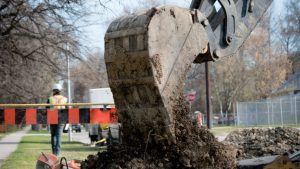The RCCAO and the Municipal Engineers Association (MEA) are one step closer to getting Ontario’s environment ministry to consider undertaking a review of the Municipal Class Environmental Assessment (MCEA) process.
The organizations recently submitted a 1,064-page application to Dianne Saxe, the environmental commissioner of Ontario, requesting a review of the Environmental Assessment (EA) Act.
"Essentially what we’re looking for is to reduce the delays, streamline the process and try to determine if there are additional exemptions or shortcuts without compromising the quality of the environment," stated Frank Zechner, legal counsel representing the Residential and Civil Construction Alliance of Ontario (RCCAO) and the MEA on the matter.
He hand delivered the application to the Office of the Environmental Commissioner on Feb. 3. The Section 61 Environmental Bill of Rights application was deemed complete and sent to the Ministry of the Environment and Climate Change (MOECC) on Feb. 8.
"When the commissioner forwards the application, it is deemed to have merit," explained Andy Manahan, executive director of the RCCAO.
The ministry is expected to consider the submission and provide a written decision indicating whether or not it will conduct a review along with reasons for that decision by April 14.
Andy Manahan
RCCAO
The RCCAO has been commissioning reports on the matter for years. What the association found is that it would take roughly 20 months to get through the MCEA process, causing significant delays.
Zechner pointed out delays could hold up necessary projects such as road work, which is a safety measure, or could relieve congestion and cause less pollution.
"These things were taking essentially two years to go through a paperwork process. Even if the project had been vetted by municipal council, had all the necessary provincial approvals, this was an additional step that is not in most other Canadian jurisdictions," said Zechner.
In addition to the MCEA process, appeals and Part II Orders, also known as bump-ups, a request to the ministry to put the project through a full, comprehensive EA adds more time. Much of the delay has to do with the fact that only a minister, not a delegate of the minister, can respond to the request, Zechner pointed out. Stakeholders have suggested delegating authority to the director of the approvals branch of the MOECC.
"There was a guideline the ministry had published as to how long the ministry should take to respond to that Part II Order request. What they found is that they were becoming more frequent and taking longer and it was not unusual to have the Part II Order request lasting more than a year. In fact in some cases more than two years," Zechner stated. "This is on top of the initial MCEA process."
Furthermore, all it takes is one person deciding they don’t want a road or a subdivision built behind their house to request a bump up.
"Once a Part II Order request is filed, all the work has to stop dead in its tracks, you cannot proceed," explained Zechner.
The application submitted by the RCCAO and the MEA was supported by 13 industry organizations including the Ontario Construction Secretariat, the Ontario Home Builders’ Association, the Ontario Road Builders’ Association, the Ontario Good Roads Association and the Ontario Sewer and Watermain Construction Association. The Region of Peel also supported the application, Manahan noted.
"That, I think helps strengthen our case," said Manahan. "The fact that municipalities are very concerned about a number of issues concerning the Class EA process speaks volumes and strengthens the argument that this isn’t just an issue that the construction industry is concerned about."
The RCCAO and the MEA are not the first to ask for a review of the EA process either, Zechner added.
"The concerns expressed by the RCCAO and MEA are not isolated. We believe the pressure is growing by a number of independent and unbiased organizations including the auditor general to bring about change," he said.
The RCCAO would have submitted an application sooner, Manahan said, but they waited for Bonnie Lysyk’s value for money audit contained in the 2016 annual report to be released last November so they could incorporate the recommendations into their report. According to Manahan, two reports requesting EA Act review were submitted in the past and did not proceed.
"There have been no substantive reforms. At best there’s been some tweaking here and there but it hasn’t been helpful in terms of the really big issues that are bogging down the process," he said.
"What is disappointing is that the minister made a commitment in early 2015 that the legislation would be reviewed in its entirety…and nothing has really happened in two years."
Paul Knowles, chair of the MEA’s MCEA monitoring committee is "hopeful the application will prompt the minister to proceed with a meaningful review of the Class EA system that results in changes," in order to combat delays.
"The threat of an excessive delay often results in poor decisions and/or increased costs," he added. "As an example, proponents may agree to project commitments that would otherwise not be considered, simply to avoid the excessive delay that would result from a bump-up request."











Recent Comments
comments for this post are closed